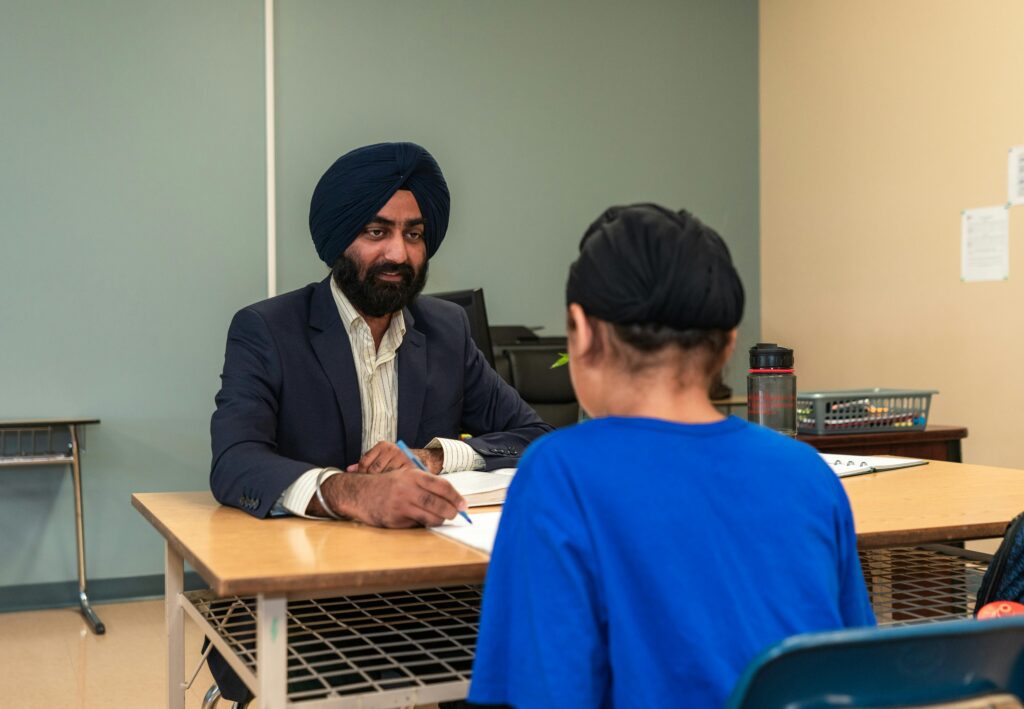Landing your dream teaching job starts long before you step into the classroom — it begins with how you prepare for the interview.
Whether you’re a high school graduate dreaming of shaping young minds, a recent education major entering the workforce, or an experienced teacher aiming for advancement, preparation is your strongest advantage. Interviews for teaching positions are not just about demonstrating your knowledge — they’re about showing who you are as an educator.
What Makes Teaching Interviews Unique?
Unlike corporate interviews, teaching interviews often test your ability to inspire, manage, and adapt. You may be asked to:
-
Present a sample lesson plan or conduct a mock teaching session
-
Explain how you would handle behavioral or academic challenges
-
Describe how you communicate with parents or collaborate with colleagues
-
Discuss how your teaching methods align with school or district standards
Schools are looking for more than credentials. They want to understand your teaching philosophy and how it translates into real classroom success.
How to Prepare Before the Interview?

Preparation is what separates a good candidate from a great one. In today’s competitive education field, schools are looking for teachers who not only understand pedagogy but also embody professionalism, adaptability, and passion for student success. Whether you’re applying for your first teaching role or aiming to advance your career, here’s how to prepare effectively before your interview.
1. Research the School or District Thoroughly
Start by learning everything you can about the school or district where you’re applying. Visit their official website, read their mission statement, and note any unique programs or initiatives they highlight — such as STEM integration, project-based learning, or community partnerships.
Look into:
-
The student population and grade levels served
-
The school’s culture and community involvement
-
Any recent achievements, awards, or changes in leadership
Understanding these details helps you tailor your responses to show alignment with the school’s values. For example, if the district emphasizes “whole-child education,” you can describe how your teaching style supports academic and emotional development. This level of preparation signals genuine enthusiasm and professionalism.
2. Review and Organize Your Teaching Portfolio
Your teaching portfolio is a powerful visual and organizational tool that demonstrates your readiness. Include:
-
Lesson plans that show creativity and alignment with state or Common Core standards
-
Student work samples (with personal information removed) that show progress or engagement
-
Certificates and credentials, such as teaching licenses, subject endorsements, or professional development courses
-
Photos or artifacts from classroom activities, projects, or bulletin boards
-
Letters of recommendation or performance evaluations
Make sure your portfolio is neat, labeled, and easy to navigate — whether it’s printed or digital. During the interview, reference specific materials as evidence when discussing your teaching experience or instructional methods.
3. Stay Current with Education Trends and Standards
Education is constantly evolving. Principals and hiring committees want teachers who stay up to date with best practices and innovations in learning. Before your interview, review current topics such as:
-
Differentiated instruction and meeting diverse learning needs
-
Inclusive education and strategies for supporting special education or ELL students
-
Technology integration, such as using Google Classroom, Edmodo, or interactive whiteboards
-
Social-emotional learning (SEL) and student well-being
-
Data-driven instruction and how assessment informs your teaching
Being able to discuss these trends intelligently shows that you’re reflective and proactive — qualities every great teacher should have.
4. Prepare Real Examples and Success Stories
Interviewers want to hear more than theory; they want real classroom stories that reveal who you are as an educator. Think about moments when you:
-
Improved student engagement or achievement
-
Handled a classroom management challenge effectively
-
Collaborated with colleagues to improve instruction
-
Supported a struggling student or celebrated a learning breakthrough
Use the STAR method (Situation, Task, Action, Result) to structure your responses. This approach keeps your answers clear, specific, and outcome-focused — making them more memorable and persuasive.
5. Practice Clear and Confident Communication
As a teacher, your ability to communicate with confidence is part of what you’re being evaluated on. Practice answering potential interview questions aloud, record yourself, or rehearse with a mentor or friend. Focus on:
-
Speaking clearly and at a steady pace
-
Maintaining positive body language, like smiling and making eye contact
-
Using professional but approachable language
-
Projecting enthusiasm — energy and positivity go a long way in education interviews
If possible, conduct a mock interview with another educator or career coach. Their feedback can help you refine your tone, eliminate filler words, and ensure your passion for teaching shines through.
Common Teacher Interview Questions (With Sample Answers & Expert Tips)

Teacher interviews often combine behavioral, situational, and philosophy-based questions — all aimed at uncovering who you are in the classroom. Below are some of the most common teacher interview questions, along with strong sample answers and pro tips to help you stand out.
1. “Why did you decide to become a teacher?”
What they’re really asking: Interviewers want to understand your motivation and passion for teaching.
Sample Answer:
“I’ve always believed that education has the power to change lives. My teachers inspired me to see learning as a lifelong journey, and I want to create that same spark in my students. Helping them discover their strengths and grow in confidence is what drives me every day.”
Tip: Be genuine. Schools can tell when you’re giving a rehearsed answer. Mention a personal story, mentor, or specific experience that shaped your decision.
2. “How do you handle classroom management?”
What they’re really asking: Can you create a safe, structured, and engaging environment where students can learn effectively?
Sample Answer:
“My classroom management approach is built on consistency and respect. I set clear expectations from day one, reinforce positive behavior, and build strong relationships with students. When issues arise, I focus on understanding the cause and helping students take responsibility rather than just issuing punishments.”
Tip: Use a real example from your experience to show results — like how your system reduced disruptions or improved participation.
3. “Describe your teaching philosophy.”
What they’re really asking: Do your values align with the school’s educational mission?
Sample Answer:
“My teaching philosophy centers on student-centered learning. I believe students learn best when they feel valued, heard, and engaged in meaningful activities. I aim to create lessons that connect academic content to real-world applications, encouraging curiosity and critical thinking.”
Tip: Keep it concise and authentic. Focus on how your philosophy translates into your teaching methods.
4. “How do you differentiate instruction for diverse learners?”
What they’re really asking: Can you meet the needs of all students — including those with learning differences, ELL students, or gifted learners?
Sample Answer:
“I use data-driven instruction and ongoing assessments to identify student needs. I modify assignments, provide visual aids, and incorporate small-group work when necessary. For example, in my last class, I created tiered reading activities that allowed students to work at different levels while achieving the same learning objective.”
Tip: Mention specific strategies like scaffolding, formative assessments, or Universal Design for Learning (UDL).
5. “How do you use technology in your classroom?”
What they’re really asking: Are you comfortable with digital tools and modern teaching methods?
Sample Answer:
“I integrate technology to enhance engagement, not replace instruction. I use Google Classroom for organization, interactive tools like Kahoot! for review sessions, and educational platforms like Nearpod for student collaboration. Technology helps me make learning interactive and accessible for every student.”
Tip: Reference specific platforms or learning management systems the school uses — it shows initiative and adaptability.
6. “How do you handle conflict with parents or colleagues?”
What they’re really asking: Can you maintain professionalism and communication under pressure?
Sample Answer:
“I believe in proactive, transparent communication. When issues arise, I listen first to understand concerns, then collaborate on solutions. For instance, when a parent was concerned about grades, I shared data and created a plan together to support the student at home and in class.”
Tip: Emphasize empathy, teamwork, and professionalism — these traits are crucial in school environments.
7. “Tell me about a time you helped a struggling student.”
What they’re really asking: Do you have patience and problem-solving skills?
Sample Answer:
“One student in my class was struggling with reading comprehension. I introduced short, leveled reading passages paired with one-on-one sessions. Over the semester, their confidence and test scores improved significantly. That experience reinforced my belief that personalized support can make all the difference.”
Tip: Always end your answer with a positive outcome or lesson learned.
8. “Where do you see yourself in five years?”
What they’re really asking: Are you committed to professional growth and long-term teaching goals?
Sample Answer:
“In five years, I hope to continue developing as an educator — possibly leading a department or mentoring new teachers. I’m passionate about curriculum design and want to help strengthen instructional strategies within my school community.”
Tip: Show ambition and loyalty without implying you plan to leave the classroom immediately.
9. “How do you assess student progress?”
What they’re really asking: Can you track learning effectively and use data to guide instruction?
Sample Answer:
“I use a mix of formative and summative assessments to measure growth. Quick check-ins, quizzes, and student reflections help me adjust lessons in real time. I also track progress over time using data tools and communicate results with parents to keep them involved.”
Tip: Highlight how your assessment methods inform your teaching — not just how you grade.
10. “Why should we hire you?”
What they’re really asking: What sets you apart from other qualified teachers?
Sample Answer:
“You should hire me because I combine a deep passion for education with a proven ability to connect with students. My classroom fosters respect, curiosity, and a love for learning. I’m also proactive in collaborating with colleagues and supporting school initiatives to ensure student success.”
Tip: End confidently. Reiterate your passion and show how your skills align with the school’s mission.
Final Thoughts: Mastering Your Teacher Interview with Confidence
Preparing for a teacher interview takes more than memorizing answers — it’s about showcasing your passion for education, understanding of classroom dynamics, and commitment to helping students succeed. By researching the school, crafting thoughtful examples, and practicing your responses to common teacher interview questions, you’ll walk into the room confident, calm, and ready to connect with your interviewers.
Remember, schools are looking for educators who inspire learning, adapt to challenges, and contribute positively to their community. Whether you’re a new graduate or an experienced teacher seeking a new opportunity, preparation and authenticity will always set you apart.
The more you align your experience, teaching philosophy, and enthusiasm with the school’s values, the closer you are to landing your dream teaching job. So take the time to prepare, believe in your impact as an educator, and show them why you’re the teacher every classroom needs.


